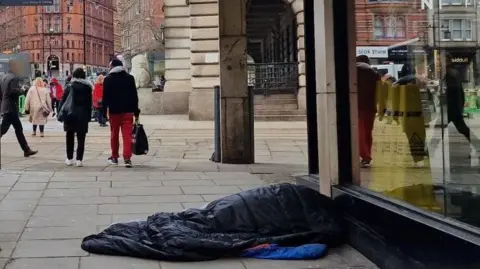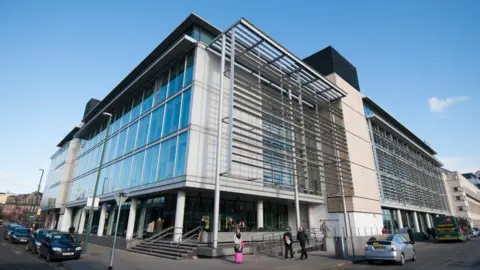Plans announced to reduce rough sleeping in city
 LDRS
LDRSA plan to reduce the number of people sleeping rough in Nottingham and get more families out of temporary accommodation has been approved by the city council.
More than 50 people are thought to be sleeping on city streets every night, and hundreds of others are being housed by the council in temporary accommodation.
The Nottingham Homelessness and Rough Sleeping Prevention Strategy aims to promote cooperation between organisations, work with charities and businesses to cut evictions, support those with physical or mental health needs and work on sourcing suitable accommodation.
The council is looking to reduce the number of rough sleepers found on a monthly count in Nottingham down to single figures by 2028.
 PA Media
PA MediaCouncil figures show 739 different people were found rough sleeping in the city over the past year, while the annual street count shows an average of 56 people sleeping rough each night.
The report also states the city has seen an increase of 122% in the number of households in temporary accommodation, from a snapshot of 349 households in 2019/20 to 776 households in 2023/24.
The strategy lists four core priorities, with the first being that homelessness is prevented and does not reoccur.
The others are; issues causing homelessness are addressed, that homelessness is brief and that rough sleeping is reduced.
These are largely to be achieved by better coordination between government and health bodies, charities and the private sector, especially in accommodation.
According to the Local Democracy Reporting Service, during an Executive Board meeting on Tuesday, Jay Hayes, executive member for housing and planning, said: "Homelessness can happen to any of us and the impact of homelessness on people's lives is enormous, but also the impact on the cost to the council to house people in emergency accommodation, most notably hotels and B&Bs."
By January 2026 the council is further hoping to reduce the number of single people placed in hotels to a snapshot of under 10, and cut the number of families placed in nightly-paid temporary accommodation to under 100.
While the council invests £4.2m a year in housing-related support, it also relies on grant funding for much of its work on homelessness.
The strategy states the council will continue to apply for such funding but admits current financing does not extend beyond 2025.
Further cuts
Dr Paul Scotting, chair of the Nottingham Homelessness Voluntary Sector Forum, says more than 40 voluntary, community and faith groups, and more than 1,000 volunteers, have been working to support the council's efforts.
"However, these are challenging times," he says in the report.
"Over the next five years, we aim to build on our partnerships with the city council, the NHS, and other statutory bodies by sharing knowledge and expertise.
"Together with the council, we also hope to forge stronger connections with the local business community to explore how they can best support our efforts to tackle homelessness."
The council declared itself effectively bankrupt in November 2023 and in March announced a series of cuts to jobs and services aimed at plugging a £53m budget gap.
Plans for £24m of further cuts and savings were published earlier this month.
The latest published figures have predicted a £172m gap in the council's budget over the next three years, but updated figures are expected in the coming weeks.
Follow BBC Nottingham on Facebook, on X, or on Instagram. Send your story ideas to [email protected] or via WhatsApp on 0808 100 2210.
